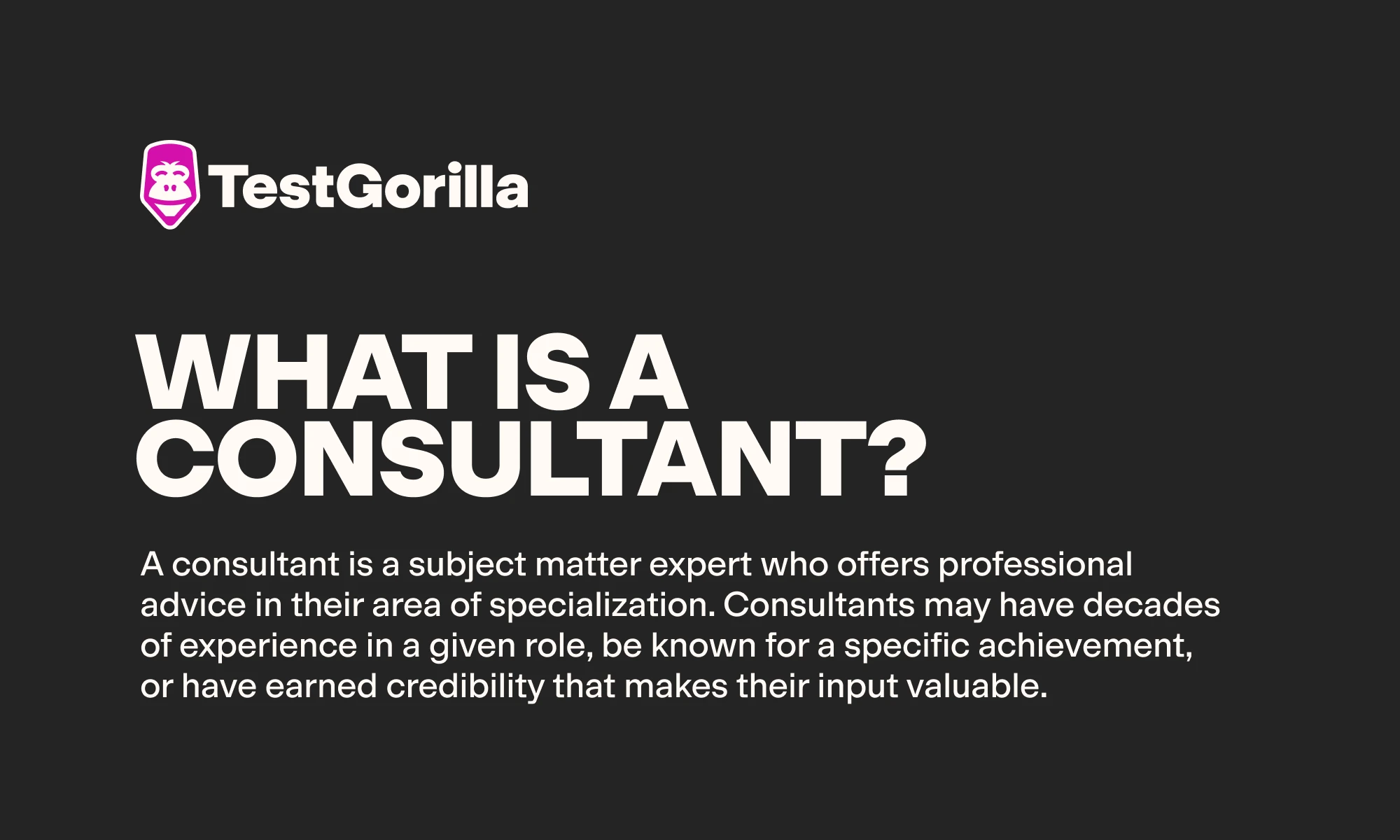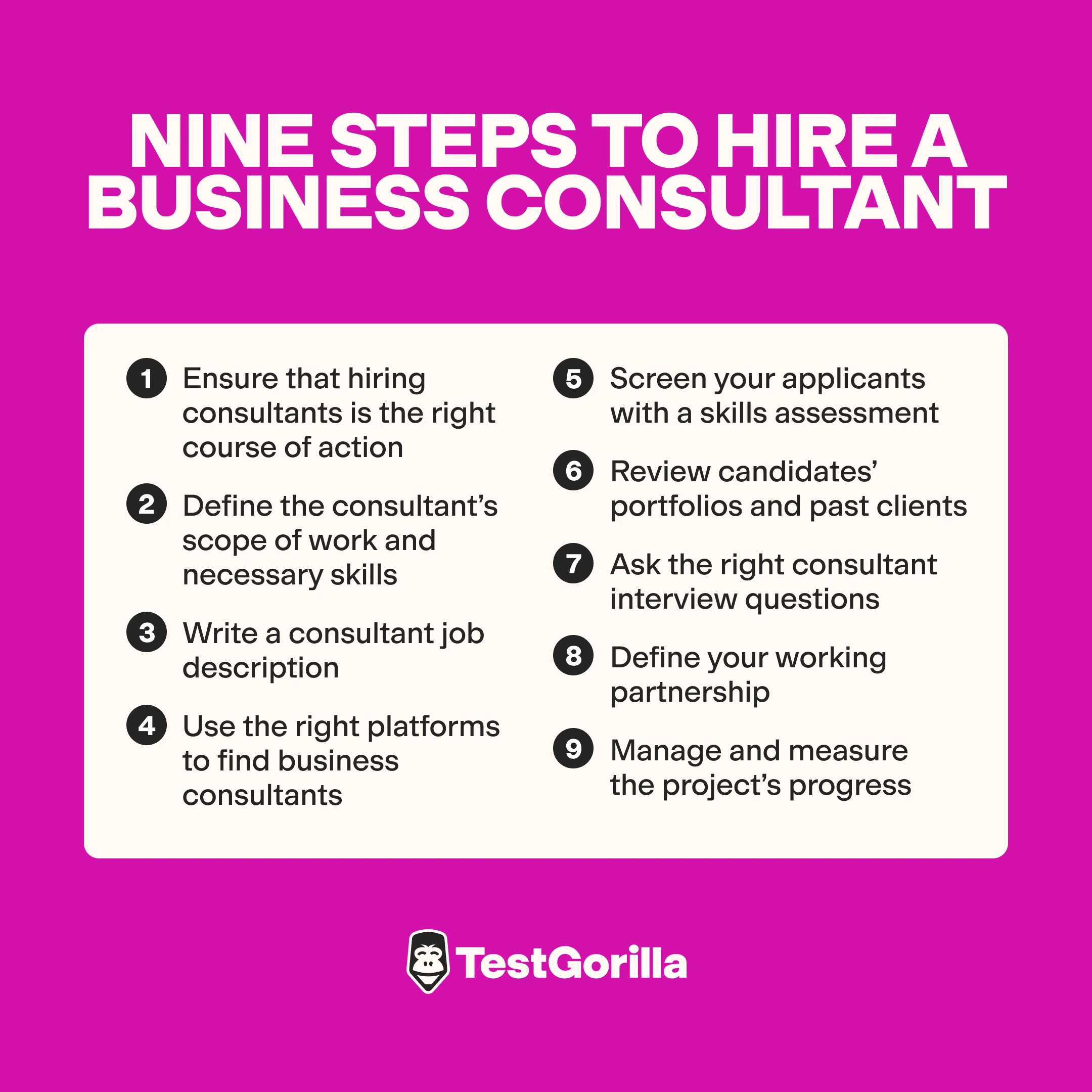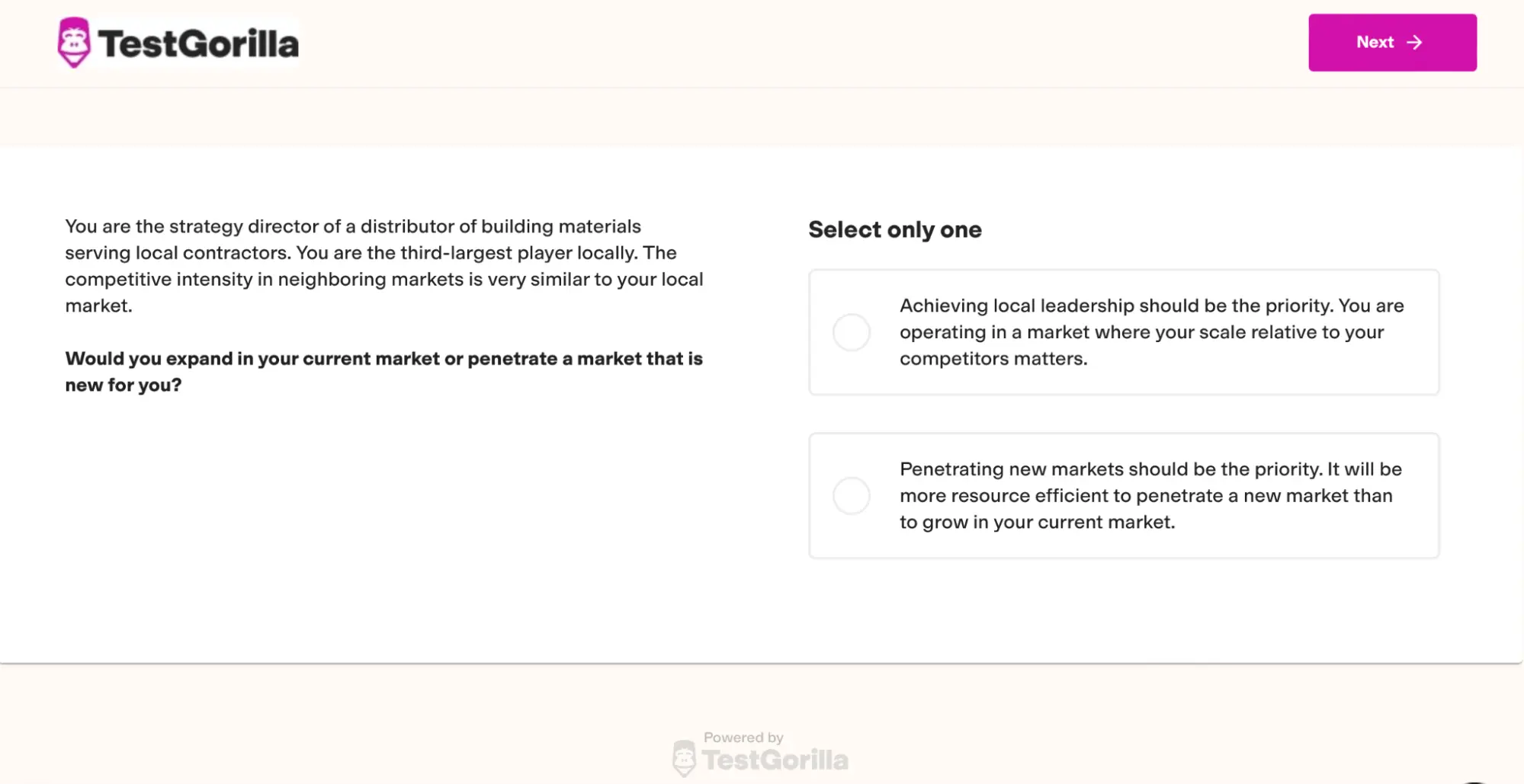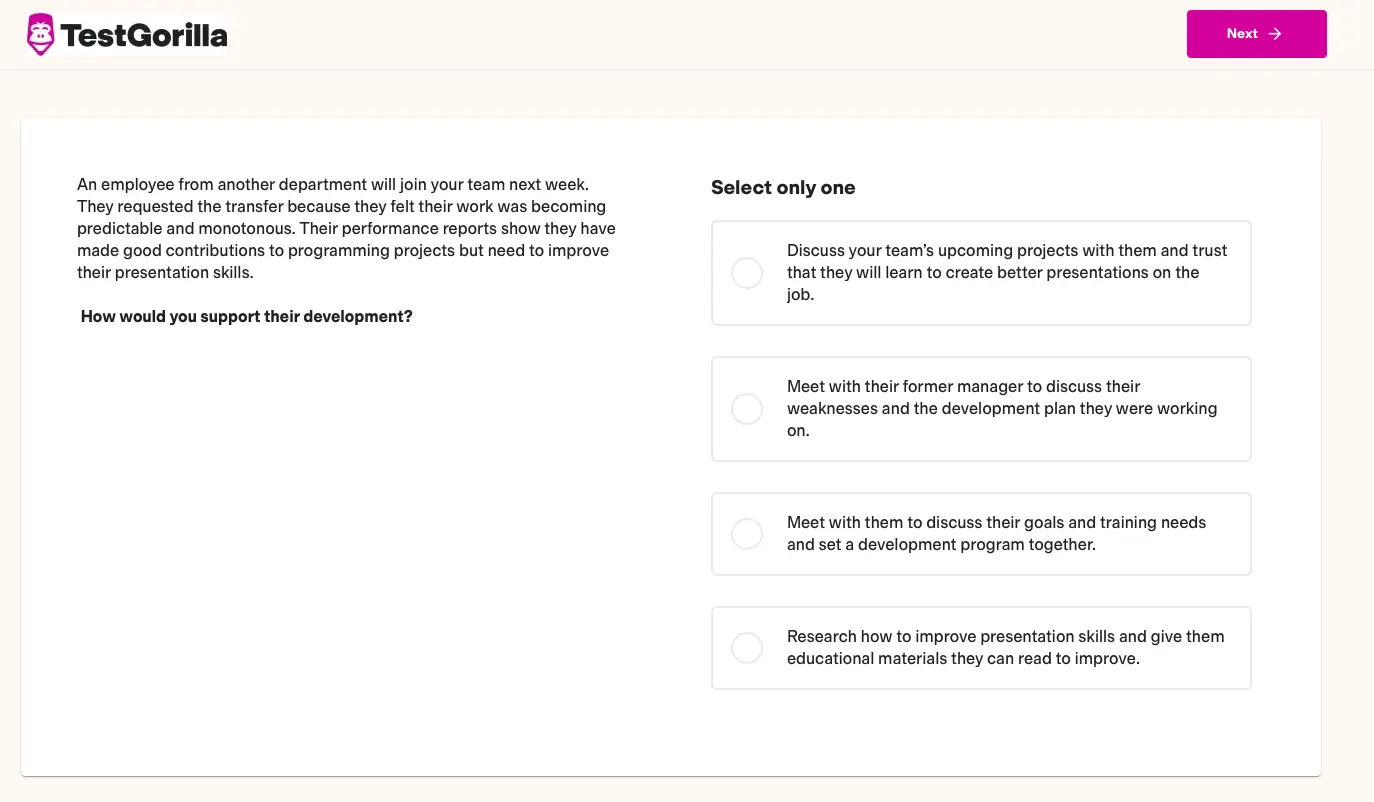Use multi-measure tests to hire the best consultant
Consultants should be the antidote to problems internal talent can’t solve. However, hiring consultants is difficult and risky.
The lack of in-house expertise hinders screening. Candidates whose portfolios reveal the right consulting skills can fail if these competencies don’t align with your needs. Since consultant services are expensive, employing a candidate whose skill set doesn’t match your expectations is particularly painful.
Skills-based talent assessments help minimize these risks.
In this guide, we explain how to evaluate your needs and screen consultant candidates effectively with predeveloped tests.
What is a consultant?
A consultant is a subject matter expert who offers professional advice in their area of specialization. Consultants may have decades of experience in a given role, be known for a specific achievement, or have earned credibility that makes their input valuable.
Typical consulting responsibilities include analyzing clients’ situations, identifying problems, suggesting fixes, and devising tailored strategies. Less often, consultants also step in to help with execution.
Since companies seldom use consultants full-time or long-term, most businesses employ them as independent contractors rather than employees. Many consultants operate as small businesses.
When and why should you consider hiring consultants?
You should hire consultants if your team lacks the in-house expertise to handle a specific project, but there’s no need to staff the role permanently.
For example, when Woodside Energy hired IBM as a consulting firm, it had a specific goal. The company wanted help going digital – moving decades' worth of contextual information and expertise from physical documents to an AI-powered database. This one-time reinforcement helped ensure data got transferred smoothly and nothing got lost.
Consultants are most valuable to businesses in such pivotal, high-stakes moments. They point out valuable opportunities, give expert tips on optimizing workflows, and help you avoid pitfalls.
Here are more examples of situations when hiring consultants is a worthwhile investment:
You’re a startup business owner getting ready to launch a new product or service
You’re preparing for a big change or growth stage or otherwise have to navigate uncharted territory
You undertake new, risky projects or initiatives and want to avoid setbacks
You need an expert to help you through a one-time fundraising campaign
Your business needs short-term expert help to keep you in the clear (for example, when healthcare companies face regulatory and compliance rules change)
You’re already navigating change and need management consulting to help with strategy adjustments and reinforcements to stay afloat
You’re going through a rough patch and have no experts on board to accurately diagnose and fix the problem
The biggest differences between consultants and staff are their role's temporary nature and specialization in a specific, often niche aspect of a field.
You could hire a consultant long-term, but it’s not the best business decision because of two reasons:
Consultants are expensive owing to their high level of expertise and years of experience
You don’t need their active input or level of specialization past a certain point
So, hiring consultants makes sense if you need somebody to guide you through a crucial time or help you set up sustainable processes that other employees can manage later.
Recruiting a full-time employee instead makes sense if you need somebody to help with the execution and management side, which doesn’t require a consultant’s level of specialization and, therefore, costs less.
Full-time employees are also more suitable if the organization needs input long-term or if they’re a missing piece required for restructuring.
The best insights on HR and recruitment, delivered to your inbox.
Biweekly updates. No spam. Unsubscribe any time.
How to hire consultants: A 9-step guide for your company
Follow these nine steps to hire a business consultant who checks your boxes.
1. Ensure that hiring consultants is the right course of action
Before you focus on how to hire consultants, make sure external help is what you need.
It’s possible to make big changes only with internal talent, as Microsoft did in 2015 following a long company crisis.
Instead of hiring consultants, Satya Nadella, the chief executive officer, asked Kathleen Hogan, the company’s head of HR, to help lead its cultural change from cutthroat and competitive to a culture of learning together. This transformation was key to rebooting Microsoft and helping it achieve its current status as the second most valuable company in the world.
Going the internal route instead of engaging the professional services of a consultant may be a good idea because employees know your company well. If the culture is good, they’re also invested in your success. Relying on internal talent is often more budget-friendly, too.
However, hiring consultants is a worthwhile expense if you don’t have the right expertise on board, and long-term talent acquisition doesn’t make sense.
2. Define the consultant’s scope of work and necessary skills
Write out a list of responsibilities to create a reasonable scope of work for the consultant.
Your consultant’s expertise should tackle tasks that require their specialization level – i.e., tasks even your top talent can’t handle internally. To save money, limit consultants’ involvement to strategic guidance and let your staff do the legwork.
Say you’re hiring a marketing consultant. They may require customer feedback and provide expert tips on the specific questions to ask, but your employees would then conduct the interviews and bring back the reports.
3. Write a consultant job description (or use ours) or a request for proposal (RFP) for consulting services
Based on the project type and your flexibility about the execution strategy, write a job description or an RFP to hire business consultants.
An RFP is an announcement of an upcoming project. It lists the project’s details and goals and invites prospective consultants to bid on it by proposing their strategy and desired compensation.
Using an RFP to hire a consultant makes sense when:
You don’t have the skills or resources to define a solid strategy in-house and want more involvement on the consultant’s part
You want to receive plenty of options to choose from rather than spend resources planning all the details yourself
You’re flexible about the execution and want to give an expert “free reign” so they can be innovative and creative with the solution
However, evaluating proposals is time-consuming and requires a high understanding of the subject matter. If you don’t have much time or a reliable way to assess the proposals, writing a standard job description is easier.
In the job post, include the consultant’s objectives, responsibilities, skills, qualifications, and experience, and provide information about your organization.
If you’re unsure how to hire a consultant in a specific industry and what to write in the job description, pick the most relevant template from our blog to get around writer’s block:
4. Use the right platforms to find and hire business consultants
Settling for an okay candidate is too risky when hiring consultants, and it’s exactly what happens when your talent pipeline is limited. A wide pool of candidates improves your chances of finding the optimal person for the job.
Explore these platforms to source high-quality candidates and hire business consultants worth every penny:
Referrals from company executives who may have worked with the type of consultants you need
Referrals from people you trust in your professional network
Freelancer job boards and social media platforms like LinkedIn
Specialized job boards like TestGorilla’s
Networking events and conferences
5. Screen your applicants with a skills assessment
Skills assessments are the most reliable way to predict role performance.
You can build an assessment that includes multiple skills tests. When hiring a consultant for your business, this test bundle helps you evaluate your candidates’ abilities.
The tests are useful for assessing technical and industry-related expertise and identifying candidates’ soft skills, business ethics, personality traits, and culture. These aspects are all imperative to job success.
Using TestGorilla’s tests, you create a holistic screening process to ensure you get all the advantages of hiring a consultant. You don’t need special internal expertise or manual labor to administer these tests.
The best part? You compare candidates automatically based on their scores, so selecting the best matches for the interview takes a little time.
Below are some commonly featured tests for a consultant role, including some examples of industry-specific evaluations from our test library:
Business Judgment test: This assessment identifies people with a knack for business who spot opportunities and make sound decisions by using questions like this one:
Business Ethics and Compliance test: Use this test to filter out unreliable consultants and identify those with strong ethics
Leadership and People Management test: This test helps you spot candidates who have what it takes to lead effectively and manage projects with multiple-answer situational questions like the one below:
Culture Add test: Offer candidates this assessment to ensure you avoid cultural mis-hires and hire a consultant who positively influences your organization’s ethos
Critical Thinking test: This assessment evaluates applicants’ ability to analyze data, form correct conclusions, and execute solutions. These competencies are vital for a consultant tasked with the “diagnosis and treatment” of your company.
Make data-driven hiring decisions using talent assessments
TestGorilla’s talent assessments give you an unbiased overview of applicants’ skills, traits, and abilities. Their results are automatically compared, leaving you with the most suitable candidates for the job. See how it works.
6. Review candidates’ portfolios and past clients
Review your candidates’ portfolios to see projects they have worked on for other companies. Checking portfolios is an effective way to determine whether your applicants’ experience matches your company’s projects.
It’s especially useful to learn which industries they have worked in, their impact on other businesses, and their collaboration style. This way, you know what to expect from working together.
7. Ask the right consultant interview questions
After assessing your applicants’ abilities, invite the most promising consultant candidates to an interview. Ask them various situational, behavioral, and experience-related consultant interview questions.
Question type | Question examples |
General (for all consultants) | - A strategy you implemented is not delivering the expected results. How do you address this? - How do you evaluate that you mesh well with the client, and what do you do if you think working with you isn’t right for them? |
Cybersecurity | Describe a method you have used to detect a data leak within a company. How did you identify the source, and what steps did you take to prevent it from recurring? |
Marketing | In highly saturated markets, what innovative approaches do you recommend for a brand to differentiate itself and create a unique value proposition? |
The results from your talent assessments are the most reliable reference of skills. However, asking these questions in the interview helps hiring managers get more context about the candidates’ thought processes.
Ensure you ask your consultant candidate for references and conduct background checks with each reference. Ask the references whether they considered using a different consultant from another firm to get a candid and accurate review of your consultant’s skills.
8. Define your working partnership
You’re now ready to establish the finer details of your project expectations and requirements.
Define these elements:
Element | Description |
Timeline | Set the dates by which you expect individual deliverables and the entire project to be completed |
Budget and payment details | Confirm the total available budget for the project, the hourly rate, and the payment platforms |
Communication | Determine when and how often the consultant should send updates, who the point of contact is, and which channels to use |
Collaboration | Appoint the specific team members the consultant must collaborate with and clarify which materials they require |
9. Manage and measure the project’s progress
The only task left is to organize procedures to monitor the project and measure its progress.
Set up routine meetings and reports and look for:
Metrics you can track as performance indicators
Milestones within different project stages you need to reach by a certain time
Personnel responsible for keeping track of the situation
Indicators (apart from the schedule) that tell you if things aren’t going as planned
Your consultant should help identify these project management elements so you’re on the same page before the project begins.
How much does it cost to hire a consultant?
Data from the Society for Human Resource Management (SHRM) puts the cost of an average hire at around $4,700, but many employers estimate the real cost to be three to four times the position’s salary. Consulting services typically cost between $50 and $200 per hour.
Edie Goldberg, the founder of Menlo Park, attributes 60% of the figure to soft costs – the time managers and other professionals spend in the recruitment and onboarding process and the time it takes away from their other activities.
The exact cost of the hiring process also depends on recruiters’ salaries or rates.
However, since consultants are typically contractors and highly skilled professionals, screening, hiring, and onboarding a consultant costs less than a full-time employee.
Our recruitment ROI calculator shows you the investment returns of using talent assessments to hire a consultant or any other professional.
Here’s what you don’t have to do when hiring a consultant for your business:
Provide access to all company programs and channels
Train them and keep financing their learning and development (Training Magazine’s report shows companies spent $1,207 on training per employee in 2022)
Pay for benefits, overhead, and other additional expenses that come with full-time employment
Skipping these steps means your new hire reaches full productivity, including acquisition and onboarding, sooner, perhaps in 40 days total, versus the months a full-time employee would take.
If you’re wondering how to hire a consultant most cost-effectively and reliably, skills-based recruitment is the answer. For example, since starting with TestGorilla, McGillicuddy Hospitality has lowered its costs per hire, estimated at €2,000 in hiring costs per position, and reduced its time-to-hire.
Switch to skills-based hiring to avoid costly mis-hires
TestGorilla’s assessments make candidate screening accurate, fast, and replicable, ensuring you have high-quality talent for every role – for 100% free. Create an account and use skills tests to hire a consultant today.
Hire consultants with confidence to build your organization’s expertise
The advantages of hiring a consultant outweigh the costs when you approach it the right way.
Considering the seniority and technical complexity of the role, it’s imperative to make hiring consultants as objective and accurate as possible.
TestGorilla’s talent assessments make recruitment easy and replicable. The best part is that you don’t need in-house experts to review the results – they are automatically scored and compared. See how it works in the demo.
Ready to hire a business consultant? Sign up for a Free forever plan today.
Finally, our product tour walks you through assessment creation in three simple steps.
You've scrolled this far
Why not try TestGorilla for free, and see what happens when you put skills first.





















